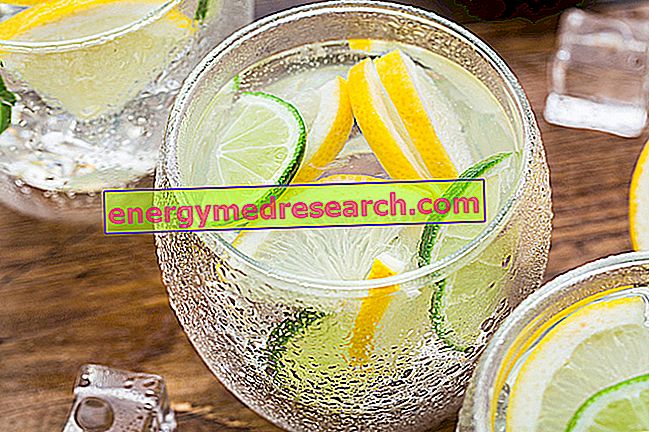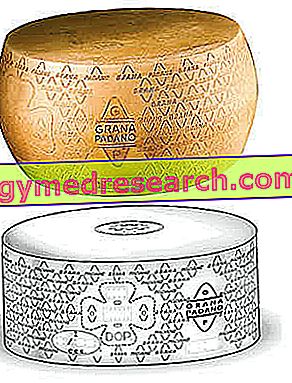Why take it?
By water and lemon we mean a drink made from mineral water, generally warm, combined with the juice and / or peel of the Citrus x limon fruit.
Very popular in folk medicine, this drink is mainly used as a purifying food, to be taken both on an empty stomach and on a full stomach.
On the other hand, the "hypothetical" functions of water and lemon are quite varied; in fact, as with all citrus fruits, even in lemon juice and peel have different properties and therefore originate two distinct beverages: water with juice - water with peel.

Fasting recruitment
Water with lemon juice to be consumed on an empty stomach, possibly in the morning, is perhaps the most widespread method to consume daily food in the diet.
This drink, hypothetically already complete, can be further enriched with other ingredients with excellent nutritional characteristics; some examples are: fresh ginger, turmeric and cinnamon.
The fanatics of this drink claim that lemon juice is able to stimulate the immune system, balance the body's pH, optimize the beauty of the skin and promote the maintenance of health.
In fact, rather than providing a good concentration of vitamin C, citric acid and mineral salts, there are no scientific bases that can demonstrate what was declared; below we will understand why.
It works?
At first glance, the answer is no.
In particular, the balance action of the pH, if referred to the blood, is totally "airborne"; this statement is justifiable by the fact that the blood circulation is regulated by buffer systems so effective that they do not undergo the influence of a food.
Moreover, the average diet of the human being tends to be more acidic than alkaline, an aspect that has caused many concerns (generally excessive) concerning above all the health of the skeleton. Precisely for this reason, various alternative food philosophies are based precisely on the attempt to increase the blood pH.
The only reason one should try to increase the acidic components in the blood is to fight off annoying urinary tract infections (cystitis). In fact, due to the balance action of the blood, the excess acid components are buffered and / or excreted, consequently lowering the pH of the urine. Ultimately, by subjecting certain microorganisms to a more acidic liquid it is assumed that these will slow down their development within the urethra.
Turning to the stomach, which often suffers from irritation, ulcers, hyperacidity, etc., there is no concrete reason why lowering the pH on an empty stomach can improve health. It is true that, being able to tolerate pH between 1 and 2, a healthy stomach could hardly suffer from exposure to food pH; in fact, lemon juice (which is among the most acidic products of all) barely reaches 2.4. In this sense, the only application of water and lemon could be aimed at promoting protein denaturation in the case of hypochloridria (chronic digestive difficulty); in this sense the drink should obviously be taken on a full stomach.
Beyond the participation of vitamin C in the synthesis of collagen, the structural protein of the skin, there are no valid reasons to justify the positive effects of the drink on the beauty of the skin.
Regarding the alleged effectiveness of stimulation of the immune system, this activity should depend on the good concentrations of vitamin C (ascorbic acid) present in the food; what many people do not know is that, if it is true that in lack of vitamin C the immune system remains compromised, it is equally true that taking more, besides the ration indispensable to the organism, does not provide any real advantage. Among other things, for the same reason, eating: peppers, peppers, parsley, broccoli, lychee, oranges, apples, lettuce, radicchio, rocket, spinach, dandelion, mandarins, guava, kiwi, grapes etc. the same effect should be obtained on the organism (or greater, given the more generous concentrations of ascorbic acid). For more information on the correlation between vitamin C and the immune system, see the article: Vitamin C.
Add Curcuma, Ginger and Cinnamon: Is it Useful?
Now known throughout the world, turmeric is an oriental spice obtained from a root that boasts excellent nutritional characteristics; among these, the concentration of antioxidants and curcuminoids stands out, responsible for an alleged anti-cancer, anti-inflammatory and anti-arthritic power. Certainly (if tolerated on the palate), turmeric can only improve the beneficial properties of the drink; however, it is still an efficacy that remains in the context of food integration.
As for ginger, it too has antioxidant and anti-inflammatory properties; in addition, it appears to have carminative, antibacterial and beneficial properties for nausea and vomiting. At first glance, ginger would seem even more useful than the lemon itself.
Cinnamon has more of a metabolic function; in particular, it acts on blood glucose levels (stabilizing it), but also on cholesterol.
Water and lemon peel
There is not much to say about water and lemon peel. It is produced by infusing the citrus peel (pericarp), whole or grated, with the white part (albedo) in hot water.
Less praised than the previous one, water with lemon peel uses a normal pH and supplies mainly essential oils and some antioxidants.
Its application is generally limited to those suffering from gastric disorders; in fact, it is a good remedy for nausea and vomiting, especially of non-infectious origin.
Also in this type of infusion, for the purposes for which it is intended, it is advisable to add fresh ginger.



